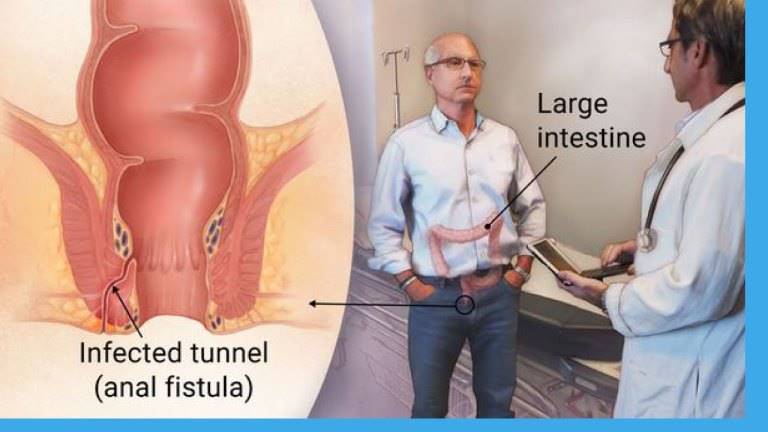An anal fistula is a small infectious tunnel in the anus. It connects an infected cavity or an abscess in the anus to an opening on the skin at the end of the anal canal. An anal fistula is somewhat common in people with a history of anal abscesses. A fistula is formed when anal abscesses do not heal properly. So, the anal fistula occurs when the glands present in the anal canal get clogged or the abscesses get infected. A fact about these abscesses is that they develop into a fistula, more often than not.
Treat your anal fistula before it gets worse!
The treatment requires more detailing as it is a complex anorectal condition. It is caused when anal glands get clogged. Some other conditions that may lead to an anal fistula:
- Inflammatory disease of the intestine
- Radiation from the treatment of cancer
- STD (Sexually Transmitted Diseases)
- Tuberculosis; although in rare cases
- Or, Cancer
When you visit a proctology specialist, they may be able to conduct an accurate diagnose, an anal fistula looks like an opening on the skin or a track. Some fistulas may not be visible on the skin’s but an anoscopy with a specialized instrument can help inside your anus and rectum. A colonoscopy is a procedure in where a lighted instrument is entered into the colon via the anus. If a fistula is found, the treatment is absolutely necessary. There are some tests that can reflect the relation to the inflammatory disease of the intestine.
What is a fistulectomy? And will it cure the fistula?
A fistulectomy is a procedure that involves the treatment of fistulas where no or little sphincter muscle involved. The skin and muscle over the tunnel are cut, the surgeon opens it up and converts it into an open groove from a tunnel. The same enables the fistula tract to heal. In complex cases of fistula, a surgeon place a special drain called a seton, which remains there for at least 6 weeks.
The wound takes up to 2 months to heal completely and the surgery can be done on an outpatient basis where the patient can go home the same day. Patients who have very large or deep fistula tunnels may be asked to stay in the hospital for a day or two after the surgery. Sometimes, a fistulas get so severe that they persist until a patient gets several operations to cure the fistula completely.
Can an anal fistula lead to anal cancer?
The risk of a person to develop anal cancer from an anal fistula often influences the development of cancer, most do not directly cause cancer. Some people with low-risk factors never develop anal cancer from a fistula, on the other hand, people who exhibit no known risk factors get the same.
The below-mentioned factors may indicate a person’s risk of developing anal cancer:
- Age: people diagnosed with anal cancer are between age 50 and 80.
- Frequent anal fistual
- Frequent anal irritation
I am in a lot of pain from anal fistula, I need to cure it!
To be fair, in almost all cases, the surgery is necessary to cure an anal fistula. An advanced procedure performed by a colon and rectal specialist with the Laser technology can help you heal faster. The traditional surgical procedures involve cuts and wounds and leave the patient bed-ridden for days.
Is there any treatment for fistula that heals faster?
Well, no one wants to get such a disastrous condition, but anyone can be a patient of fistula. If you are looking for the best treatment of fistula, your timings couldn’t more perfect. Now, with the advancements in medical science, medical procedures in which the fistula tract is ablated. The modern procedures are performed under General anesthesia. The most advanced treatment takes somewhere between 60-90 minutes depending on the severity of the condition.
In the day-to-day lifecycle, feeding and excretion of wastes is a natural process. If the natural process feels painful, inflicts discomfort, then a modern surgical procedure is the fastest way to cure the problem. Anyone can put an end to the fistula with laser surgery.
A mindset that surgical procedure might inflict an unwanted complication is up-rooted in India. The same is true for traditional (open) surgery. However, the new and advanced treatment heals faster with laser ablation technology. The treatment is minimally invasive, involves fewer cuts or wounds, and rarely inflicts any complication.
If you are looking for a treatment procedure for anal fistula, make an appointment with the best piles doctor for you. You can call Pristyn Care to schedule a consultation meeting. The Pristyn Care team is dedicated to provide the best treatment and ensure high-quality care.
If the abscess and fistula are treated properly with modern surgical procedures, they will not recur.
What are the benefits of laser treatments?
It is the most promising & successful treatment for Anal Fistula. A study was conducted in Italy and Germany on Laser treatment and both studies reported zero instances of infection in the ablation patients who were studied. Laser surgery not only offers a permanent solution but also ensures faster recovery, minimal or less pain after surgery, reduced risk of infection, reduced risk of rectal stenosis or prolapse, known as Aesthetically the best procedures as well as no diet restrictions. Patients are generally discharged within 24 hours of surgery as they can perform daily activities.
This post was last modified on November 13, 2019 11:01 AM

